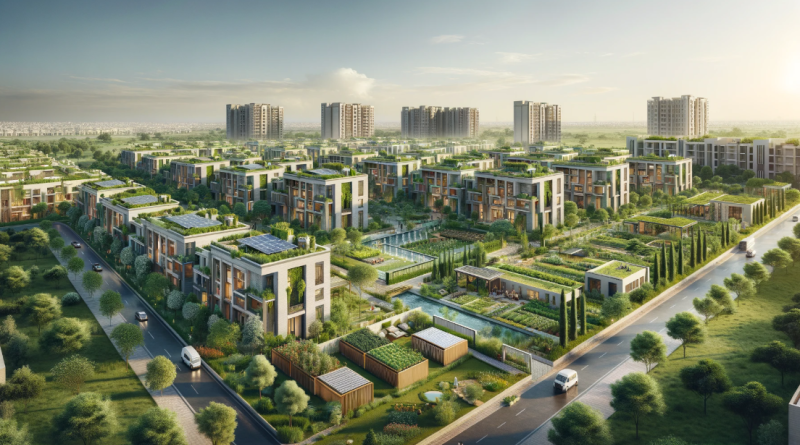Pakistan’s real estate industry: Urgent need for eco-friendly practices
The real estate sector in Pakistan is one of the largest contributors to economic activity, often referred to as the “mother of all industries.” From construction materials to employment generation, it plays a central role in shaping the country’s economic future. However, as the industry continues to grow, it has become evident that traditional practices can no longer meet the dual challenges of urbanization and environmental sustainability.
Real estate tycoon Syed Rehan Gillani is championing a revolutionary approach to development—one that integrates eco-friendly practices with cutting-edge technology. His vision addresses the growing demand for housing in Pakistan while preserving natural resources for future generations.
A booming industry: Real estate as the backbone of Pakistan’s economy
The real estate industry in Pakistan is a sprawling sector, contributing approximately 2-3% of the GDP, with indirect impacts on allied industries such as steel, cement, glass, and transportation. Mega projects, housing societies, and commercial hubs have sprouted across the nation, reflecting the growing demand for urban infrastructure.
While the industry’s growth highlights its potential, it also brings significant challenges, particularly environmental degradation and inefficient resource utilization.
The environmental cost of traditional real estate practices
Excessive Energy Consumption: Pakistan’s real estate sector relies heavily on energy-intensive materials like cement and bricks, contributing significantly to greenhouse gas emissions.
Urban Heat Island Effect: Concrete-heavy construction and the lack of green spaces in cities like Karachi and Lahore lead to rising urban temperatures, exacerbating the impacts of climate change.
Unregulated Waste Disposal: The construction industry generates massive amounts of waste, much of which ends up in landfills or waterways, harming ecosystems.
Pressure on Natural Resources: The unchecked use of sand, limestone, and water in construction is depleting these resources at an alarming rate.
Syed Rehan Gillani: Pioneering a green revolution in real estate
Visionaries like Syed Rehan Gillani are addressing these challenges with innovative, sustainable approaches. Gillani emphasizes that the future of real estate lies in tech-integrated sustainability. His strategies focus on:
Green Technologies: Incorporating smart energy systems and sustainable materials.
Vertical Urbanization: Reducing urban sprawl by promoting high-rise developments that conserve land and resources.
Sustainable Infrastructure: Ensuring housing projects include green spaces, energy-efficient designs, and waste management systems.
The role of technology in driving sustainable real estate
Smart Building Systems: Modern technologies, such as IoT (Internet of Things), enable the creation of “smart buildings” that optimize energy use through automated lighting, heating, and cooling systems. These systems reduce energy waste and operational costs.
Renewable Energy Integration: Solar panels, wind turbines, and energy-efficient grids can be seamlessly incorporated into housing developments. This not only cuts costs for residents but also reduces the national carbon footprint.
Digital Planning and Modeling: Tools like Building Information Modeling (BIM) allow developers to plan, design, and construct buildings with minimal environmental impact by simulating energy use, material efficiency, and waste reduction strategies.
Green Construction Materials: Advancements in material science have led to eco-friendly alternatives such as recycled steel, bamboo, and low-carbon concrete. These materials reduce emissions and enhance structural durability.
Smart Water Management: Technologies like rainwater harvesting systems and greywater recycling significantly reduce water wastage in residential and commercial projects.
Innovative solutions for a sustainable future
Promote Renewable Energy in Real Estate Projects: Developers should integrate renewable energy systems into housing societies. Solar-powered homes and wind energy solutions can drastically cut electricity costs and reliance on non-renewable energy sources.
Encourage Vertical Urbanization: High-rise buildings that use vertical space efficiently can address the housing demand without encroaching on agricultural and green land.
Mandate Green Certifications: Introducing mandatory eco-certifications like LEED for real estate projects will encourage developers to adopt sustainable practices.
Public Awareness Campaigns: Educating the public about the benefits of eco-friendly housing will create demand for green real estate, pushing developers to innovate.
Government Incentives for Sustainable Projects: Tax breaks, subsidies, and streamlined approval processes for green projects can incentivize the private sector to invest in eco-friendly developments.
Syed Rehan Gillani: A leader for the times
Pakistan’s real estate industry needs visionaries like Syed Rehan Gillani now more than ever. Gillani’s commitment to integrating green technologies and sustainable practices positions him as a leader who understands the delicate balance between growth and conservation. His focus on modernizing housing solutions while respecting the environment is the direction Pakistan must take to ensure long-term prosperity.
Gillani’s ability to blend innovative technology with eco-conscious strategies provides a model for real estate developers across Pakistan. His leadership is not just reshaping the industry—it is laying the foundation for a greener, more sustainable nation.
Conclusion: A call for action
Pakistan’s real estate industry stands at a critical juncture. The challenges of urbanization and climate change require an immediate pivot toward sustainable practices. By adopting green technologies, promoting eco-friendly designs, and supporting visionary leaders like Syed Rehan Gillani, the country can transform its real estate sector into a model of innovation and sustainability.The time to act is now. Building green is no longer an option—it is the key to a thriving and sustainable future for Pakistan.

